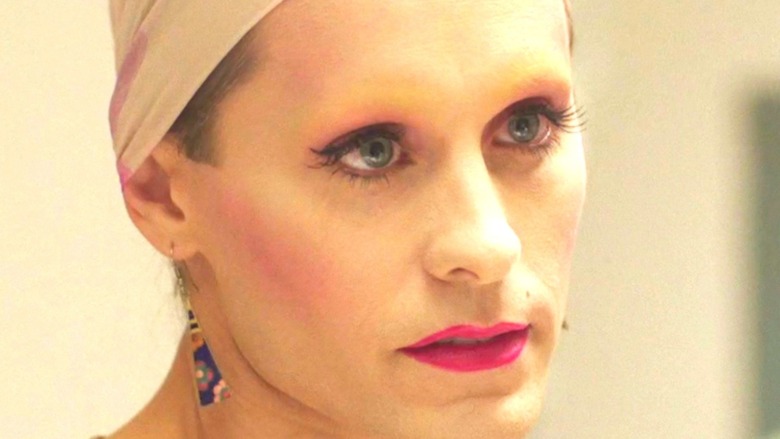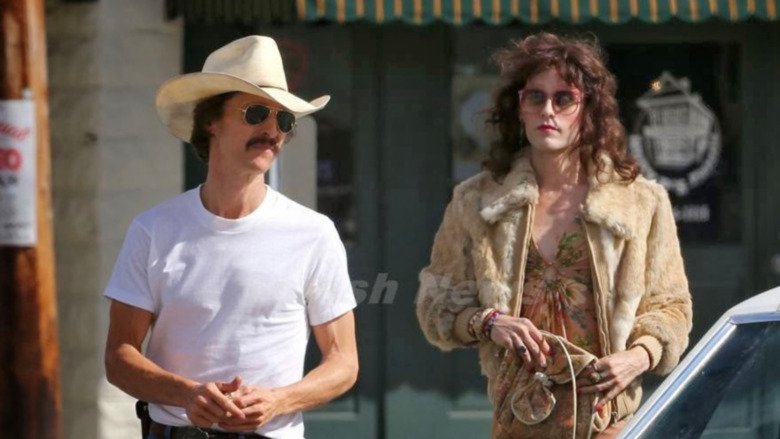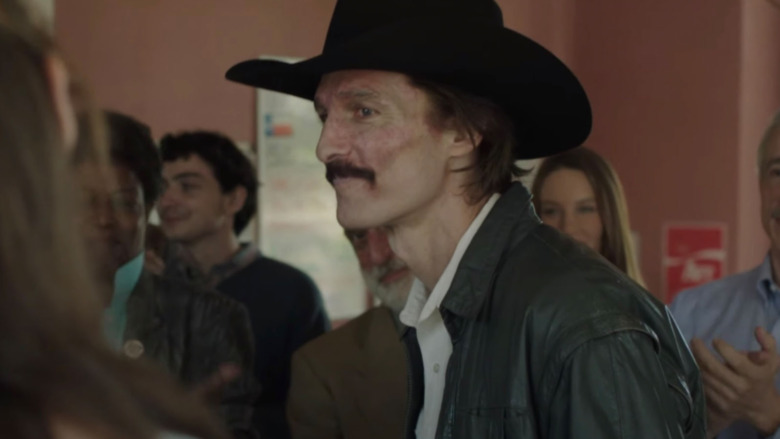The Ending Of Dallas Buyers Club Explained
As a movie, 2013's Dallas Buyers Club is both a hard-hitting look at the realities of getting medical care during the American AIDS epidemic of the 1980s and 1990s, as well as the story of one man's journey toward becoming a better person.
Based on the real life of AIDS patient Ron Woodroof, Dallas Buyers Club follows Ron (Matthew McConaughey), a hard-partying Texas rodeo performer and electrician who's diagnosed with AIDS in 1985 and given months to live. This comes as a shock to him, largely in part due to his homophobia. But rather than accept his fate, Ron works the system to get medication that treats his illness but hasn't yet received FDA approval, and establish the "Dallas Buyers Club." Along the way, he meets people like Rayon (Jared Leto), an HIV-positive trans woman with whom he forms an unlikely friendship.
By the end of the film, Ron's battle against the FDA is unresolved, but there's no doubt he's a better human being than he used to be.
Dallas Buyers Club ending pt. 1: from homophobe to ally
Ron changes as a character in many ways throughout the movie, and one of the most prominent is when he evolves past his bigotry. It takes a while for him to get there, though.
When we first meet Ron, he reads a newspaper report about the death of Rock Hudson and makes homophobic jokes to his co-workers. He hasn't yet been diagnosed with AIDS. Once he is diagnosed, he's forced to interact with people from the LGBTQ+ community whom he never would have spoken to before. Per Slate, the character of Rayon was created as a composite of the many people Ron met during his treatment.
Ron and Rayon's friendship develops slowly. Rayon is friendly and kind to Ron right away, but he only grudgingly tolerates her. Once Ron discovers Rayon has been selling some of her AIDS medication to friends who can't afford or obtain it, he realizes she has access to a potential market of customers who will buy unapproved drugs. It's still not a friendship at this point — just a business relationship.
The change in their relationship comes later in the movie when Ron and Rayon are shopping for groceries. They run into Ron's friend T.J., who earlier made homophobic jokes about Ron following his diagnosis. When T.J. is rude to Rayon at the grocery store, Ron sticks up for her by putting T.J. in a headlock and forcing him to shake her hand. The bigot he used to be is gone.
This is also the point in the film when Ron's goal changes. His original reasons for securing unapproved AIDS medication were selfish — for his own personal use, and to make money off Rayon's contacts. But thanks to his friendship with Rayon, he starts to be tolerant and selfless, and that mindset is still in place at the end of Dallas Buyers Club.
Dallas Buyers Club ending pt. 2: from selfish to selfless
Ron's years of obtaining and selling unapproved AIDS medication have changed him. He's seen up close how the system has neglected people with AIDS, and he decides to do something about it: sue the FDA to force it to change.
As Dallas Buyers Club ends, Ron loses his lawsuit against the FDA. It's not a total defeat — the movie suggests this is an unjust ruling and mentions that he did go on to win his case after the events of the film — but Ron feels defeated. But the moment he arrives back home, his friends give him a round of applause. This is a much different place from where Ron began. In the movie's first scene, we meet Ron as he's having unprotected sex in an arena while a rodeo is ongoing. He watches while the crowd cheers another rodeo performer — and they cheer even louder when that performer gets trampled. Ron and rodeo riders like him only receive applause — and therefore approval — when they're providing entertainment, and the crowd obviously has no concern for their well-being. Ron might not realize it at this moment, but he's chasing applause for all the wrong reasons.
Contrast that with the end of the film. Ron didn't win the case, but his friends still applaud him for fighting. Unlike the rodeo crowd, his friends' approval is genuine and unconditional. This completes Ron's transformation. He used to be someone who tried to impress people who like seeing him get hurt. Now, he's someone who fights for the people he cares about. Ron hasn't just learned not to be a bigot. He's learned what's really important in life.


